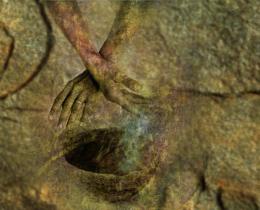Omega: What gets you out of bed in the morning?
Neil: The mystery. The strangeness and beauty of being human. Spiritually and emotionally, all the different people and landscapes and happenings teach me so much. The beauty of the Pacific Northwest is a big part of that right now. I love it. I travel widely, but there’s something magical about Washington State and Oregon. I currently live in the Olympic Peninsula region of Washington. The animals fill me with wonder—the eagles, hawks, fish, whales, coyotes, mountain lions, and black bears are a constant delight. Just like a kid, I don’t want to miss a moment.
Omega: What does a modern day mystic’s life look like?
Neil: I create plenty of time for what looks an awful lot like nothingness, but is really a kind of delicate connectedness. Simply to allow the natural contemplative impulse to be woven into the day; observing, listening, being still inside. I recognize that whether I’m in the grocery store or the forest, the café or the car, there is always valuable wisdom to be absorbed. Divinity ceaselessly emanates its teaching and beauty into every stone and branch of creation. The mystical human learns to identify and decode these signals, like a spiritual detective. It should be fun. If it’s not fun, you’re doing it wrong.
Omega: What’s the best question you've ever been asked?
Neil: The best question I’ve ever been asked came frequently from a much-loved old teacher, who simply asked me the same question once a year, every year, for seven years. The question was, “What are you?” Apparently, my answer reflected my current level of attainment. Each time it was a bit more truthful.
Omega: In your book The Unfoldment you say that your path began with “puzzlement as to why most people’s lives follow a single fated formula—work, rest, eat, sleep, repeat.” Where has the puzzlement led you?
Neil: It led me to identify a thing I call empire: a control ethos that compels humans to either embrace their sovereign nature or else live in gloomy servitude. From an ultra zoomed-out perspective, it is a game of will. Nevertheless, for the time being, the consequences are very serious. Most people fail. They relinquish their power through choosing sleepy obedience. I was fortunate enough to receive instruction from wise elders who taught me to cultivate strength, lucidity, and fierce individualism. Once I got the hang of it, I smashed the old repetitive formula and created something actually worth doing for myself.
Omega: Can you talk about inner vision and how people can begin to trust what they see?
Neil: One has to cultivate discernment first. Learning to discriminate between good and bad, quality and rubbish, harmony and disharmony. Having the courage to think for oneself, say no when something is wrong, to be an individual. When that skill is developed to a certain threshold, an inner vision then arises that takes things to the next level. You’re not just figuring stuff out on your own anymore—the wisdom stream of the world itself flows through you. But you have to earn it.
Omega: What are some of the changes you see happening in our world and how can we prepare for these changes?
Neil: Fake cities are crumbling. The media is collapsing. Political correctness is finished. Empire is almost over. Everything false is going away. Earth changes are therefore imminent. We bring them. They are ours. Strong people, with honor and valor in their heart, will come to the fore and lead. People we can have faith in and love. These things are already beginning. All we have to do as individuals is to think and act as truthfully as we can, and the next phase of evolution will unfold as it needs to.
Omega: What makes a location feel sacred?
Neil: Some places have masculine, upwelling energy (giving, amplifying) and some places have feminine, down-welling energy (yielding, reducing). Some are used for growth. Some for dissolution. They are both sacred and extremely powerful. There are thousands of these sites across the world in wilderness locations. Energy grid intersection points, where the dragon lines cross. Some are public and well known. Some are private and secret. But you can find them yourself. Just walk and feel.
Omega: What’s your favorite space in nature?
Neil: That’s a tough one. It used to be mountains, rivers, lakes, forests and all that sort of thing, which we have lots of here in Washington and Oregon. However, in recent times, I’ve also become very fond of the deserts of Arizona, Nevada, Utah, and New Mexico. I guess I’ve come to appreciate those places in the American Southwest where everything is so expansive, and there’s nowhere to hide in oneself. Very purifying. Very revealing.
Omega: You’ve said that mainstream culture is not a representation of human culture. Can you talk more about this disparity?
Neil: Mainstream culture is a contrivance of empire. It is designed to contain human consciousness to a lower state through repetition, decadence, and disconnection. Natural human culture does the opposite, it raises people, is singular, connecting, and evolutionary. Mainstream culture is synthetically manufactured on a mass scale, human culture is typically hand-made on a small scale. It's good to know which you are consuming.
Omega: What does magic look like in your life and how can we all cultivate more magic in our lives?
Neil: Magic and truth go hand in hand. When truth is being radiated in your every thought, step, and word, magical things happen without fail. First synchronicities and symbols arise in the environment, which are enormously inspiring. With more truthful living comes massive juicy wizard stuff that makes your spine tingle. The degrees between the two depend on the truthfulness we can harness in ourselves. Without a doubt, it is witnessing good people transform themselves through pure will that is the most impressive magic of all.



